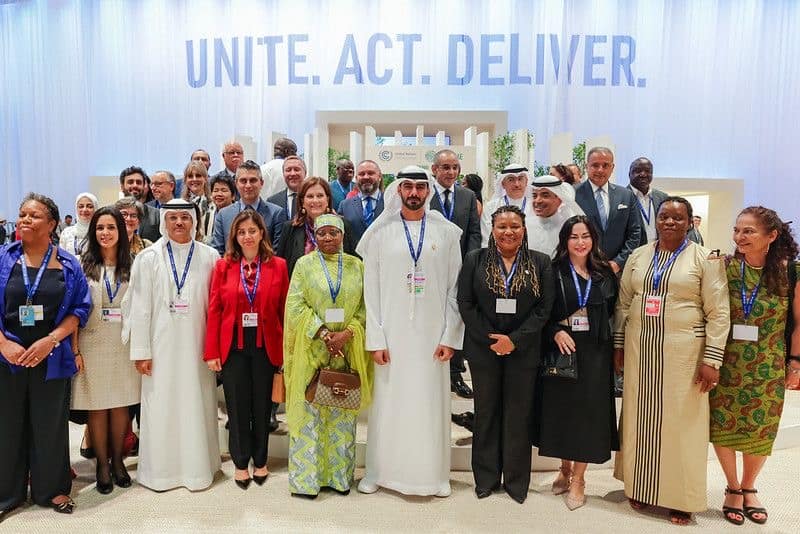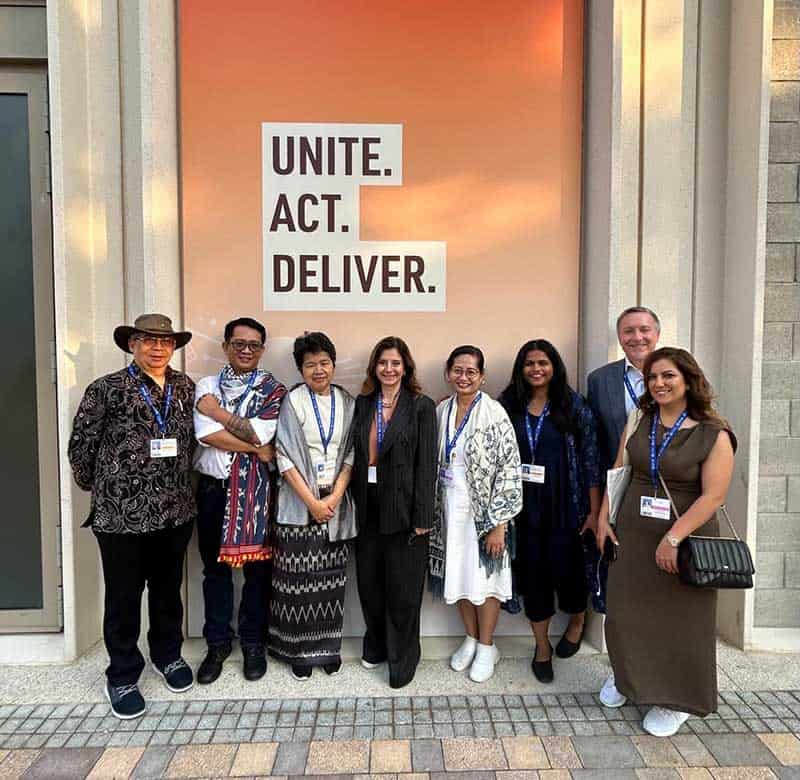The Historic and Enigmatic COP28
The enigmatic United Nations Climate Change (COP28) meeting was hosted by an oil nation headed by an oil baron, Sultan al-Jaber, as COP28 president, where governments discussed how to limit and prepare for future climate change.

Against a backdrop of controversy, geopolitical conflicts, and increasing extreme weather events, the summit took place in Dubai, in the United Arab Emirates (UAE), one of the world's top 10 oil-producing nations, from November 30 to December 12, 2023. Although it overran a day with a historic outcome when it came to implementing the landmark Paris Agreement, which has three main pillars: mitigating future climate change by reducing carbon emissions, adapting to future climate disasters, and redressing the loss and damage that can’t be prevented.
Establishing a Loss and Damage Fund
As climate-driven disasters continue to make headlines around the world, the fate of millions in especially vulnerable regions such as Africa and Southeast Asia hinged on the question of how countries will adapt to climate change and who exactly will pay for the phenomenally expensive undertaking.
A recent report said finance for adaptation needed to reach US$194bn-US$366bn a year. Yet the most recent evidence showed that adaptation funding went down 15% in 2021 from the previous year to US$24.6bn.
Pressure was high throughout the conference to avoid appearing to have caved to OPEC lobbyists. So, the first day of the conference kicked off with establishing a first-of-its-kind loss and damage fund to help nations hit hardest by the climate crisis.
Mary Friel, the IFRC’s Climate Policy lead, pointed out that
“The historic progress on Loss and Damage which began this COP was a notable success. But not moving forward on adaptation would be a major failure.”
The Loss and Damage Fund needs funds! While current commitments get the fund off the ground, they are a tiny fraction of what’s needed.
Jagan Chapagain, the Chief Executive Officer and Secretary General of the IFRC added,
“This agreement is a step in the right direction – but we needed a leap. The establishment of a Loss and Damage Fund and progress on the Global Goal of Adaptation are both welcome. It’s good, too, that there’s some improved language on mitigation. But this is not yet backed by the necessary finance, and everything is happening far too slowly. We need to be focused on reaching those who need action most. Communities are suffering now. They need action now.”
Effective coordination is needed with wider funding arrangements to identify gaps and reach people in need. Because we will see more intense, frequent, and overlapping extreme climate and weather events destroying homes, lives, and livelihoods, with sea level rise taking away people’s lands and ways of life.
The IFRC supports communities to prepare for and react to extreme weather and climate-related hazards worldwide. Those hazards are getting more frequent and worse. In just the last two weeks alone, while COP28 has been underway, Red Cross and Red Crescent staff and volunteers have been helping people following floods in Kenya, Angola, Ethiopia, the Dominican Republic, and Tanzania. Families and communities are already dealing with the very real impacts of extreme weather; as climate change gets more severe, those needs will grow exponentially. We, therefore, remind the world that words are never enough. We need action, a great leap forward in action.
Establishing a Group of Friends - Culture-Based Climate Action Plan

After a decade of campaigning for the Global Call to put Culture at the Heart of Climate Action,
on December 8th, participants in an inaugural meeting at COP28 unanimously adopted the Emirates Declaration on Culture-Based Climate Action. The Global Call to Action initiative is backed by founding signatories and is funded by the UAE Ministry of Culture in partnership with the ALIPH Foundation.
Architectural practices are central to climate mitigation strategies, to foster partnerships that prioritize sustainable urban environments in climate policy, and to showcase innovative design strategies that reduce carbon footprints and enhance resilience to climate change.
“It’s important to mention that buildings contribute up to 80% of CO2 emissions, so developing a sustainable architecture is critical, not only to achieving SDG11 by creating resilient, inclusive, and energy-efficient urban spaces but also to fight climate change (SDG 13).”
pointed out the International Union of Architects (UIA) team members Dr. Iman O. Gawad, Professor of Sustainable Architecture, Fine Arts Faculty, Helwan University, Cairo, Egypt, Cid Blanco, Co-Director of the UIA Commission on the UN Sustainable Development Goals and Gaetan Siew, Founding Partner, Visio Architects and UIA Ambassador to COP28.
The historic inaugural meeting of Culture-Based Climate Action at COP28 was live streamed, where H.E. Sheikh Salem bin Khalid Al Qassimi, UAE Minister of Culture, explained:
“We need to create a path for integrating culture into climate policy for the future, as well as raise awareness of culture’s transformative powers to change behavior and imagine its ability to unlock creative solutions that can engage all members of society across all sectors.”
The inaugural meeting was attended by over 30 Ministers or government representatives and a large delegation of committed cultural advocates, such as UNESCO, ALECSO, ICESCO, the European Union represented by the European Commission, ALIPH (International Alliance for the Protection of Heritage in Conflict Areas), Brazil Climate Action Hub, British Council, Europa Nostra/European Heritage Hub, International Centre for the Study of the Preservation and Restoration of Cultural Property (ICCROM), International Council of Museums, (ICOM), International Council on Monuments and Sites (ICOMOS), International Peace Institute, Julie’s Bicycle, People’s Palace Projects, Petra National Trust, The Siam Society Under Royal Patronage, Southeast Asian Cultural Heritage Alliance (SEACHA), and World Monuments Fund (WMF).
FUTURE OF ENERGY ART SHOW AT THE RESILIENCE HUB OF COP28
“The launch of the Group of Friends of Culture-Based Climate Action is a landmark achievement of which we can be proud of. I am looking forward to launching the now-more-urgent-than-ever Dubai-Baku-Belem Action Plan for Culture together,”
added Andrew Potts of the Climate Heritage Network Secretariat.
Reducing Fossil Fuel Production and Use
Government ministers representing nearly 200 countries at the COP28 agreed to a deal that calls for transitioning away from fossil fuels in energy systems in a just, orderly, and equitable manner, accelerating action in this critical decade to achieve net zero by 2050 in keeping with the science after a previous proposal was met with heated and widespread backlash.
Climate advocate and former US Vice President Al Gore warned in a post on X that the summit was “on the verge of complete failure,” pointing specifically to OPEC as part of the problem.
“The world desperately needs to phase out fossil fuels as quickly as possible,”
Gore added.
“With an unprecedented reference to transitioning away from all fossil fuels, The UAE Consensus is delivering a paradigm shift that has the potential to redefine our economies,”
The summit’s UAE presidency said on social media.
Selva Ozelli Esq, CPA is a legal and finance executive with diversified experience dealing with highly complex issues in the field of international taxation and related matters within the banking, securities, Fintech, alternative and traditional investment funds. Her first of its kind legal analyses involving tax laws, Foreign Corrupt Practices Act (FCPA), blockchain technology, solar technology and the environment and have been published in journals, books and by the OECD. Her writings have been translated into 15 languages.

